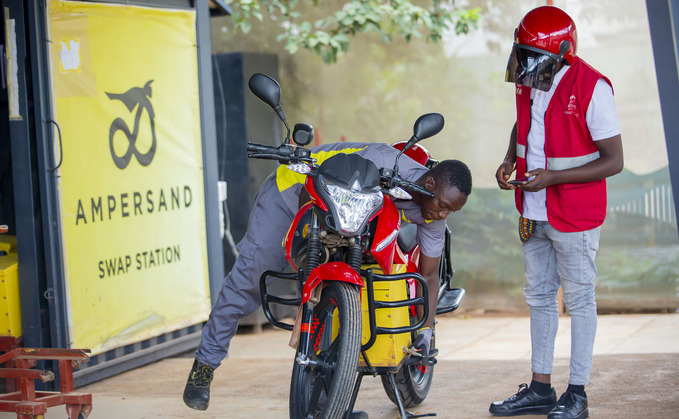Ampersand, a Rwandan-based electric transport energy company, has secured $19.5m in funding to expand its e-motorcycle fleet and battery swapping network in Kenya and Rwanda.
The company, which was founded in 2016, claims to be the largest electric motorcycle company in Africa, with over 1,000 e-motorcycles on the roads of both countries.
The funding round, which was announced last month, was led by Ecosystem Integrity Fund, a US-based impact investment fund, and joined by other investors, including the EU’s ElectriFI programme and Factor[e] Ventures. The funding will enable Ampersand to scale up its operations and reach more customers, especially motorcycle taxi drivers, who are the main users of its service.
Read also: Fez Delivery now delivers electric bikes, motorcycles in Nigeria
A cheaper and cleaner alternative to petrol bikes
Ampersand’s business model is based on providing e-motorcycles and smart batteries to drivers, who can swap their batteries at any of the company’s swap stations across the two countries. The company says that its service is cheaper and cleaner than using petrol bikes, as it saves drivers up to 40% on fuel costs and reduces carbon emissions by nearly 8,000 tons.
According to Ampersand, its e-motorcycles can travel up to 75 km on a single charge, and have a top speed of 85 km/h. The batteries can be swapped in less than two minutes, which is faster than refuelling. The company also offers financing options to drivers who want to own their e-motorcycles.
Ampersand’s CEO, Josh Whale, said that the company’s vision is to create a world where motorcycle transport is more profitable and sustainable for its consumers than ever before. “Going electric will double a driver’s income now, and leapfrog Africa towards a zero carbon future,” he said.
Ampersand, a growing market for electric mobility in Africa
Ampersand is not the only player in the electric mobility market in Africa, which is expected to grow rapidly in the coming years, driven by the increasing demand for transport, the rising cost of fuel, and the need to reduce air pollution and greenhouse gas emissions.
Other companies, such as Opibus, Asobo, and Ecobodaa, are also offering e-motorcycle solutions in Kenya, while Zembo and Bodawerk are operating in Uganda. In addition, there are several initiatives to promote electric buses, cars, and bicycles in various African countries.
However, Ampersand believes that it has a competitive edge over its rivals, thanks to its world-class R&D, extensive testing, and customer-centric approach. The company also plans to expand to other markets in the region, such as Tanzania, Ethiopia, and Uganda, in the near future.
Ampersand’s success story is an example of how innovation and investment can help accelerate the transition to low-carbon transport in Africa, and create green jobs and economic opportunities for millions of people.
Impact of electric motorcycles on air pollution
Since electric motorcycles don’t produce any greenhouse gases or smog-causing tailpipe emissions, they can help reduce air pollution. A University of Michigan study found that electrifying motorbike taxis in Kampala, Uganda, can lower emissions of some local and global air pollutants, potentially improving local and worldwide sustainability.
According to a different study conducted by Claremont McKenna College, if 90% of electric motorcycles are battery-powered by 2030, carbon emissions will have significantly decreased by 11 billion tons between now and 2050. In addition to reducing fuel expenses, electric motorcycles can enhance riders’ income and well-being. For this reason, electric motorcycles may offer an effective low-carbon transportation option in Africa and other areas.
